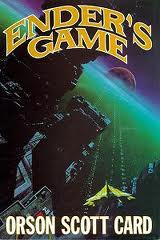How video games will save the planet
4.5 Acorns
So when Kelly Helder, in her welcome to the section last week, said Ender’s Game basically changed her life I decided it was probably about time to read it for myself. And since we’ve decided to do what we’re calling “Classic Reads,” and highlight North Carolina staples of literature, I had the perfect opportunity. There’s nothing quite like being forced to read; it’s what got me through grad school.
But holy. flying. spacesuits.

I wish I could say that I wish I had read this years ago. But I think I read it at exactly the right time for me. Warning: even as an adult, this book WILL make you want to abandon all your responsibilities and just go be really good at Battle School. Fortunately, we’re all WAY too old to be chosen anyway. Nevermind that battle school isn’t a real place.
And, at least for me, this coming of age tale isn’t really a poignant one. I never found myself crying, or getting chills, or cursing the fates that made Ender Wiggin such a hero. Instead, I found myself cheering him, finding ways to rationalize my daily interactions with others like he did, imitating his calm methodology in my gravity-challenged life.
And this coming of age tale is an accelerated one, so no need to wait for the good stuff to happen. Just like Ender’s own development, the story speeds ahead.
Ender’s Game is set in a futuristic world in which the human race has begrudgingly bonded together politically and joined forces in a sort of intergalactic United Nations. This group, called the International Fleet, was formed to protect humankind from an extremely intelligent alien race, the Buggers.
Ender’s Game was the first of a whole series of books by Orson Scott Card about Ender’s intergalactic adventures. So if you just absolutely love this book, don’t despair. You’ll have the opportunity to spend more time with Ender once the game is over.
Called such because of their insect-like appearance, the Buggers have attacked earth twice in efforts to colonize. The first time, they devastated the planet; the second time, they were miraculously beaten back. Now, the third Bugger War is at hand, and Andrew Wiggin, known as Ender, looks like humanity’s only hope.
Oh, and Ender is six years old.
The youngest of three children, Ender is a “Third,” which is nothing to be proud of in a society that has capped family populations at two children each. He is allowed to be born, however, because his two siblings were potential prodigies who didn’t quite make the cut: his older sister Valentine was brilliant but too kindhearted, and their older sibling Peter was too ruthless, a psychopathic killer with no need for provocation.
And while Ender proves to be just the right balance of each sibling’s faults, and is whisked away to battle school (or, well, flown away. Battle School is essentially a space station), never to see his mother or father or brother Peter ever again, these siblings never really leave him. Peter haunts his dreams as the taunter from his childhood, the one he is terrified of becoming but desperately wants approval from. Valentine is the mother figure his own mother never was to him, and represents for him love and a sense of home when he realizes there is no such stability in the sterile place he has come to live, Battle School.
But at every turn of the page, Ender excels in this new place. He is repeatedly pushed into impossible situations by his teachers and mentors, hoping to prepare him quickly for the impending war — which you find out about half way through the book is only a number of years away now. And at this point Ender is like eight.
After mastering the war games of the school, and establishing a strong Army of young but loyal soldiers, he is promoted to Commander School years before anyone else ever has been. At this point he is about 10.
Once in Command School, it’s only a matter of time until the Bugger War comes to a head, and some unexpected plot twists come to light.
Thankfully. Because while the motives for bugger war are rationalized in an annoying clean cut way, those twists, and the political intrigue that takes place on a parallel story line back on earth, keep this tale from being too cut and dried whole grain bread. Goodness knows I can’t handle too much moral fiber in my fiction.
Because this book was first published in 1985, it’s available any number of ways, in a range of costs and reprints. I purchased and read mine on an E-Reader for $5.99.
No matter how you get it, just get it. I’m confident that even readers who are reluctant when it comes to sci-fi will be pleasantly surprised with this book.
And when you read it, and you’re ready, contact me. I’m building a Dragon Army, and I’ll be needing some good soldiers.
